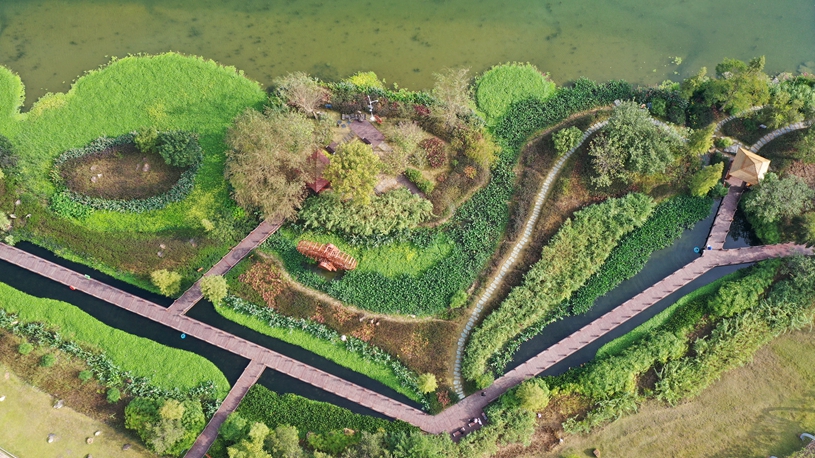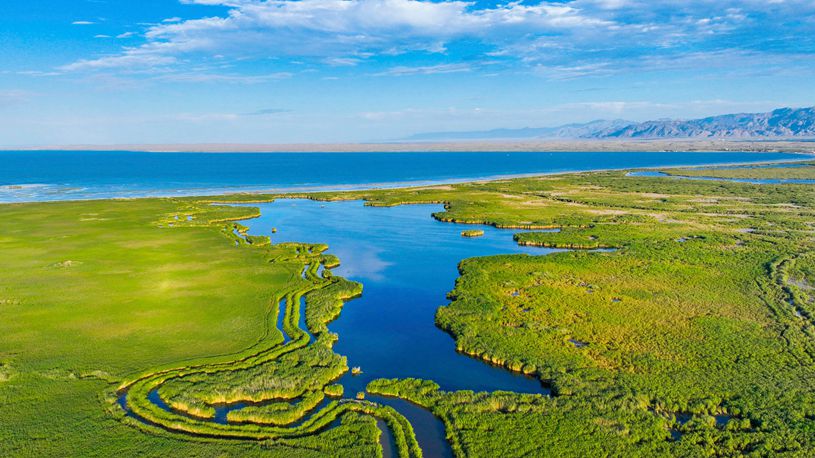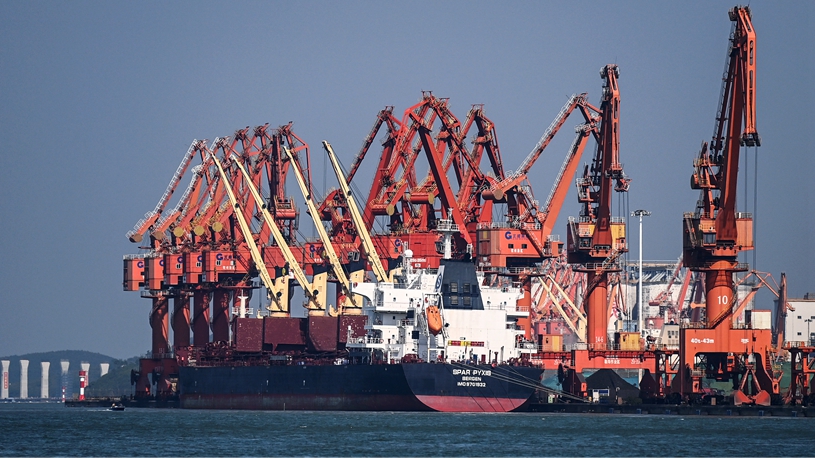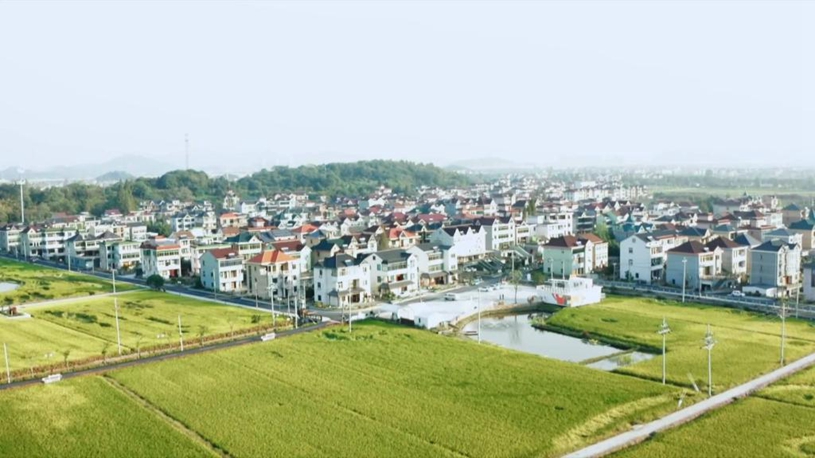
Chinese Premier Li Keqiang poses for a group photo with leaders attending the 25th China-ASEAN Summit in Phnom Penh, Cambodia, Nov. 11, 2022. (Xinhua/Yue Yuewei)
PHNOM PENH, Nov. 12 (Xinhua) -- Chinese Premier Li Keqiang on Friday attended the 25th China-ASEAN Summit in Phnom Penh, during which a joint statement on China-ASEAN cooperation has been released.
The following is the full text of the joint statement:
CHINA-ASEAN JOINT STATEMENT ON STRENGTHENING COMMON AND SUSTAINABLE DEVELOPMENT
We, the People's Republic of China and the Member States of the Association of Southeast Asian Nations (ASEAN), gathered at the 25th ASEAN-China Summit in Phnom Penh, Kingdom of Cambodia, on 11 November 2022.
RECALLING with satisfaction the celebration of the 30th Anniversary of China-ASEAN Dialogue Relations in 2021 with our significant achievements reflected in the Joint Statement of the ASEAN-China Special Summit to Commemorate the 30th Anniversary of China-ASEAN Dialogue Relations, in particular the establishment of the China-ASEAN Comprehensive Strategic Partnership, which is meaningful, substantive and mutually beneficial;
RECALLING the important documents adopted by the two sides in recent years, including the China-ASEAN Strategic Partnership Vision 2030, the Joint Statement of the China-ASEAN Special Summit to Commemorate the 30th Anniversary of China-ASEAN Dialogue Relations, the China-ASEAN Joint Statement on Cooperation in Support of the ASEAN Comprehensive Recovery Framework (ACRF), and the China-ASEAN Joint Statement on Enhancing Green and Sustainable Development Cooperation;
REAFFIRMING the principles, shared values and norms enshrined in the Charter of the United Nations, the ASEAN Charter, the Treaty of Amity and Cooperation in Southeast Asia (TAC), the Five Principles of Peaceful Coexistence and the East Asia Summit (EAS) Declaration on the Principles for Mutually Beneficial Relations (Bali Principles), as well as universally recognised principles of international law;
SUPPORTING ASEAN's leading role in the shaping of the regional architecture by promoting closer cooperation through ASEAN-led mechanisms;
NOTING with appreciation the various activities carried out by the two sides under the framework of the ASEAN-China Years of Sustainable Development Cooperation in 2021 and 2022;
RECALLING the statements and visions put forward by China and ASEAN to promote sustainable development in the region, including ASEAN Community Vision 2025, the ASEAN Outlook on the Indo-Pacific (AOIP) and Belt and Road Initiative (BRI);
ACKNOWLEDGING China's Global Development Initiative (GDI) and appreciating its goal of complementing the implementation of the UN 2030 Agenda for Sustainable Development, taking note of China's announcement of new financial measures at the High-level Dialogue on Global Development to promote global development, and of China's initiative to build a peaceful, safe and secure, prosperous, beautiful and amicable home in the region;
RECOGNISING the increasingly complex and cross-cutting challenges the region continues to face, arising from geopolitical shifts, protectionism, complex transnational threats, climate change and rapid technological change, which are exacerbated by the COVID-19 pandemic and its adverse impact on our peoples' livelihoods and well-being, societies and economies;
RECOGNISING the importance of China-ASEAN cooperation in promoting a sound global and regional environment for development, maintaining regional peace, stability and security, sharing experiences and development opportunities in the face of major challenges, while emphasising ASEAN-China cooperation in strengthening common and sustainable development will be conducive to realising the Sustainable Development Goals in the region and beyond;
EMPHASISING the implementation of the UN 2030 Agenda for Sustainable Development by upholding people-centered development, and commitment to inclusive growth and building a future of life in harmony with nature, so that no country, no person is left behind;
NOTING the importance of development issues in the international cooperation agenda acknowledging that international development cooperation can better suit local conditions and better address the actual needs of developing countries, and give priority to capacity-building through cooperation, exchanges of best practices and technical assistance, including through ASEAN-led mechanisms;
Hereby agree on the following:
1.Reaffirm commitment to development and give priority to development undertakings, and deepen cooperation through extensive consultation and joint efforts, so as to build a meaningful, substantive and mutually beneficial China-ASEAN Comprehensive Strategic Partnership, for peace, security, prosperity, and sustainable development;
2.Continue to implement the Initiative for ASEAN Integration and the ACRF; emphasise the importance of ASEAN unity and centrality in promoting ASEAN's sub-regional development; and recognise the relevance of sub-regional development, to ASEAN's regional integration and community-building process, especially in narrowing the development gap within ASEAN and between ASEAN and the rest of the world, taking into consideration emerging gaps, challenges, and priorities from the impact of the COVID-19 pandemic;
3.Advance cooperation in infrastructure development, accelerate the implementation of the China-ASEAN Joint Statement on Synergizing the Master Plan on ASEAN Connectivity (MPAC) 2025 and the BRI, enhance connectivity between ASEAN and China, facilitate cross-border travel and trade, and promote people-to-people exchanges;
4.Support cooperation in the four priority areas of the AOIP, namely maritime cooperation, connectivity, UN Sustainable Development Goals 2030, and economic and other areas of cooperation; promote mutually beneficial cooperation between the BRI and the AOIP; explore development cooperation with the GDI to complement the realization of ASEAN Community Vision 2025, support ASEAN community-building process, and further strengthen existing ASEAN led-mechanisms;
5.Promote cooperation on Fourth Industrial Revolution (4IR) and digital transformation, including smart manufacturing and green industrialization, jointly explore the building of economic corridors and demonstration zones for international industrial capacity cooperation, welcome interested ASEAN Member States to participate in the building of China-Singapore (Chongqing) Demonstration Initiative on Strategic Connectivity New International Land-Sea Trade Corridor, and jointly enhance regional supply chain connectivity and its resilience;
6.Implement the China-ASEAN Plan of Action for a Closer Partnership of Science, Technology and Innovation for Future (2021-2025) to expand cooperation on science, technology and innovation;
7.Implement the agreed deliverables of the China-ASEAN Year of Digital Economy Cooperation, further enhance cooperation in e-commerce, smart city development, artificial intelligence, micro, small and medium-sized enterprises (MSMEs), human capital development in digital technology and application, digital transformation, and cyber security, to grow the digital economy and promote women's entrepreneurship;
8.Strengthen cooperation in the development and application of new and emerging energy technologies, the mobilisation of green investment/financing, capacity building, promote the just transition of energy and upgrading of industrial structures, welcome the proposal to establish the China-ASEAN Clean Energy Cooperation Center (ACCEC), and achieve low-carbon economic development as well as green and sustainable growth;
9.Continue to promote regional economic integration, welcome the official launch of negotiations on further enhancing the China-ASEAN Free Trade Area, support the full and effective implementation of the Regional Comprehensive Economic Partnership (RCEP), and deepen cooperation on customs, Technical Barriers to Trade (TBT) and Sanitary and Phyto-Sanitary (SPS) affairs to facilitate unimpeded trade; make full use of the China International Import Expo, China-ASEAN Expo, China-ASEAN Business and Investment Summit and other platforms to support ASEAN to expand exports to China, including agricultural products, among others;
10.Strengthen cooperation in the field of public health, by implementing initiatives such as the Programme on Public Health Emergency Preparedness Capacity (PROMPT), while working towards finalizing China-ASEAN Memorandum of Understanding on Health Cooperation; strengthen cooperation in disaster risk reduction and management, and implement the China-ASEAN Work Plan on Disaster Management 2021-2025; support regional production and the open and unimpeded supply of key materials such as food, vaccines and medical supplies, and energy in ASEAN;
11.Commit to protecting and improving people's livelihoods through promoting sustainable and inclusive development, and continue to carry out exchange of activities and pilot projects such as China-ASEAN Social Development and Poverty Reduction Forum and Village Leaders Exchange Program aiming at enhancing social development, poverty reduction, and regional food security;
12.Promote women's role in the implementation of the ACRF for sustainable development and growth and socio-economic resilience in the region;
13.Take note of China's initiative to set up a special loan for ASEAN and China's common development; encourage the further use of the ASEAN-China Cooperation Fund (ACCF) in promoting practical cooperation; encourage global and regional financial institutions such as the World Bank, the Asian Infrastructure Investment Bank, and the Asian Development Bank to provide more development resources to the region; and
14.Carry out capacity-building and experience-sharing activities between think tanks from ASEAN Member States and China to support policy making, including but not limited to circular economy and sustainable development. ■












